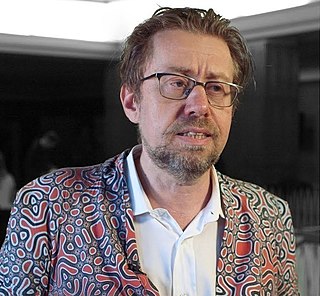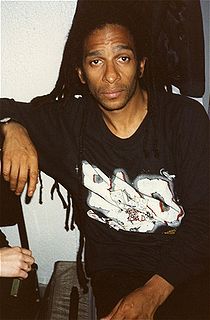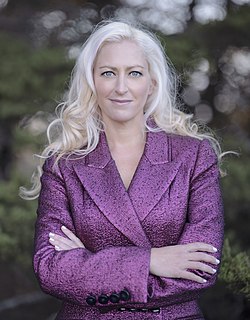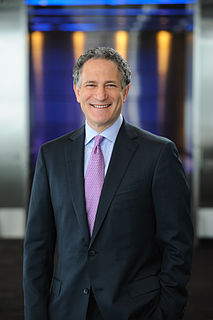A Quote by Daniel Pinchbeck
The idea that I really like is December 21st, 2012. Try to get a global moment of collective reflection as a way to bring about an uptick in human consciousness.
Quote Topics
Related Quotes
The themes that run through all my work are that consciousness is the ultimate reality; and that by understanding consciousness, you understand everything about yourself, about perception, about creativity, about behavior, about relationships. By understanding consciousness, you have the ability to create anything in your world. And you have the ability to influence also the collective consciousness to not only bring about personal healing, but social transformation, and ultimately healing our planet, which happens to be extremely wounded.
You feel the communion of the collective consciousness in that moment when you're on stage doing something and the audience is absolutely with you. And the audience becomes a collective entity as well. They come in from separate places and socio-economic backgrounds, and places across the world and days that they've had, and then they come together and they become one collective thing, and experience something in a collective way.
Our problem is that the climate crisis hatched in our laps at a moment in history when political and social conditions were uniquely hostile to a problem of this nature and magnitude-that moment being the tail end of the go-go '80s, the blastoff point for the crusade to spread deregulated capitalism around the world. Climate change is a collective problem demanding collective action the likes of which humanity has never actually accomplished. Yet it entered mainstream consciousness in the midst of an ideological war being waged on the very idea of the collective sphere.
I think that everything in the world around us is a reflection of what is going on inside of us. So each of us as an individual creates a life - we draw to us certain people and events and circumstances that reflect what's going on inside of us, so we can literally look at our life and see a mirror of our own consciousness. And if that's true on an individual level, it's also true that what's going on in the world in a bigger way is a reflection of the collective consciousness.
Pictures are the idea in visual or pictorial form; and the idea has to be legible, both in the individual picture and in the collective context - which presupposes, of course, that words are used to convey information about the idea and the context. However, none of this means that pictures function as illustrations of an idea: ultimately, they are the idea. Nor is the verbal formulation of the idea a translation of the visual: it simply bears a certain resemblance to the meaning of the idea. It is an interpretation, literally a reflection.
I write in the studio, I don't sit around with a piano or a guitar and write songs. I get satisfaction out of that because I can finish the song really quickly. I can use whatever momentum I have. I've got to put it down, develop it, and get it as far [as I can], because the excitement of the moment of when you get that idea - you want to try and hold it and build on it and really gain strength from it. Being in the studio and writing songs like that is really the best way.
Samadhi is the journey from individual to collective consciousness. The steps of Samadhi are the steps towards reaching the collective consciousness. In meditation, the more we radiate love, compassion, peace, harmony and tranquility, the more is our contribution towards the collective consciousness. The more we positively contribute towards the collective consciousness the more is our progress in Samadhi.
[In] the 21st century, the mainstream can satisfy your every whim. I guess the idea of walking around with groups of people dressed the same and saying, "I'm only into ska" or "I'm only into whatever" - is kind of restrictive in the 21st century. I don't know if it's a bad thing that these movements have run their course. I think what I miss about it is the collective experience.
In the future, I think it's pretty plausible that collective intelligence tools and skills will be important in order to be a part of global dialog, global business, and global creativity. People who know how to negotiate collective intelligence networks are going to be in a good position to contribute to global society.
The healing of ourselves is the healing of the whole nation. Society is only a manifestation of our collective consciousness and our collective consciousness has a lot of fear, violence and hatred in it. ... It is possible to transform our heart...Not much time is needed...(the transformation can be born) the moment you vow to go in the direction of peace and service.
?What color is a chameleon placed on a mirror? ... The chameleon responding to its own shifting image is an apt analog of the human world of fashion. Taken as a whole, what are fads but the response of a hive mind to its own reflection? In a 21st-century society wired into instantaneous networks, marketing is the mirror; the collective consumer is the chameleon.
I really challenge every actor at the beginning of a process, and I always say, 'I have an idea that I'm going to bring to the table. I hope and expect that you will have an idea and bring it to the table. But the way I really want to work is that together we're going to have a third idea that is better than either of our ideas.'
The experience I'm talking about has given me one certainty: the salvation of this human world lies nowhere else than in the human heart, in the human power to reflect, in human meekness and in human responsibility. Without a global revolution in human consciousness, nothing will change for the better, and the catastrophe toward which this world is headed will be unavoidable.



































